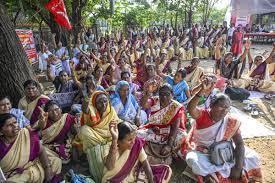Labour of care: On the Anshakalin Stri Parichars, women community health workers.
Women who facilitate rural health care should get better wages.
For decades, the women who serve as Anshakalin Stri Parichars (ASPs) in Maharashtra have been performing some of the hardest, yet least acknowledged, labour in the rural health system. For a wide breadth of responsibility, their monthly wage has stagnated at ₹3,000 since 2016, decades behind inflation. They also lack job security, pensions, safety gear and travel allowance. In 2023, a labour court in Nagpur acknowledged that they deserved at least the protection of the Minimum Wages Act but left the decision to the State. In keeping with its verbal-only assurances, the State has even now only promised them ₹6,000 a month by December 2025 — much less than what multi-purpose health workers receive. The indifference is not accidental: ASPs, who predate Accredited Social Health Activists (ASHA) and anganwadi workers, have been easy to ignore because they are poor, rural women. Their neglect reveals a gendered and caste-inflected hierarchy of labour within public health, where skilled work is low status and devalued because of who performs it. Their ongoing protests are part of an arc of agitation following similar sit-ins in Kolhapur, Nagpur, Ratnagiri and Yavatmal. In this regard, their plight resonates with that of ASHAs in other States. ASHAs, created under the National Rural Health Mission in 2005, are the community’s first link to the health system and are also officially classified as “volunteers” rather than employees, compensated only through oft-delayed incentives, amounting to less than subsistence. Across States, ASHAs have repeatedly agitated for fixed honoraria, recognition as government staff and social security, and, like the ASPs’ protests, have borne the same refrain: States cannot continue to build their health systems on the underpaid labour of women.
These struggles highlight a structural contradiction. While India relies heavily on women community health workers and attendants to deliver maternal and child health care, immunisation and disease surveillance, especially in rural areas, it refuses to recognise them as workers entitled to minimum benefits and dignity. The reliance is often framed as offering rural women “opportunities” for public service. Yet, in practice, it is exploitation. These women risk snakebite while clearing hospital grounds and death in accidents en route to vaccination duty without insurance or compensation. A health system that does not value the people who keep it functional and link its margins to formal care is bound to sabotage itself. To secure rural health is to secure the rights of those women through living wages, safe working conditions and stable employment.
